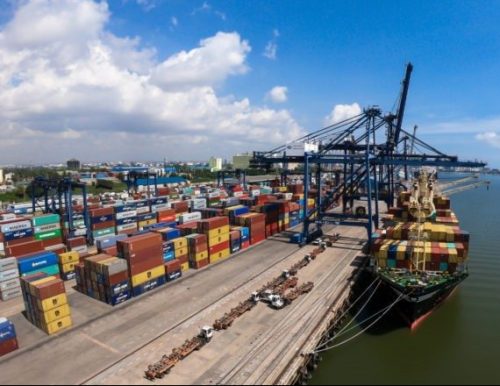As Nigeria today celebrates her 59th independence anniversary today, some stakeholders in the maritime sector have expressed displeasure over the state of affairs in the industry, which they said has experienced stunted growth over the years.
The stakeholders, who spoke in separate interviews with SHIPS & PORTS, lamented that the sector is still bedeviled by many challenges, which have prevented Nigeria from becoming a key player in the global shipping business with little action on the part of government.
Maritime lawyer, Mr. Emeka Akabogu, who described the nation’s maritime industry as being in a state of suspended animation after 59 years of independence, decried the level of decay in infrastructure, which he noted, would have been dead if not for the port concession programme.
According to him, “The Nigerian maritime industry is a bundle of contradiction after 59 years; somewhat in a state of suspended animation. There Is a lot of awareness and apparent activity but very little value accruing to the country. Some parts of the industry are highly sophisticated and up-to-date, particularly in maritime law and those segments of the industry interfacing with offshore exploration and production. Others have remained frozen in time and stuck in a rut, for instance the import clearance value chain, including freight forwarding and Customs administration. Worse off is physical assets and support infrastructure, which if not for the port concessions, may have been dead by now.”
For foremost shipowner and Chairman, Starzs Investment Company, Engr. Greg Ogbeifun, indigenous participation in the shipping sector has witnessed stunted growth over the years due to lack of implementation of the Cabotage Act.
He said there was need for government to review the provisions of the guidelines for the disbursement of the Cabotage Vessel Financing Fund (CVFF) to make it identical with the process of disbursement of the Nigeria Content Development Fund to enable the sector witness more accelerated growth.
Also speaking, the President, National Council of Managing Directors of Licensed Customs Agents (NCMDLCA), Mr. Lucky Amiwero, said a major setback for the maritime sector was the policy inconsistencies of the Federal Government.
“The maritime sector has gone so bad with many challenges ranging from policy somersault, maladministration and defects that have seriously affected our economy. One of the driving forces to generate wealth in the industry is captured on the Cabotage, Local Content and the NIMASA Acts. But since the Cabotage Act was enacted since 2003, nobody has benefitted from it.
“The auto policy has also affected our transport sector. Why did government have to wait this long to cancel the policy? When other countries are building their transport sector, we are busy increasing tariff on vehicles. Our tariff is the highest in the world. We don’t have that anywhere in the world. Our transport sector has experienced a decay and up till now, we don’t have scanners at the port,” he said.
Mr. Amiwero blamed government for lack of development in the sector, stating that recommendations by stakeholders on how to move the sector forward have often been neglected by the government.
The Chairman of Port Consultative Council (PCC), Otunba Kunle Folarin, on his part, said despite the huge potentials of the nation’s maritime sector, Nigeria is yet to match these potentials with the opportunities created over the years.
“We are not matching the opportunities we have in the sector. The maritime sector potential is great, the demand factor is great but we are not matching the potentials in terms of providing the services that will make us take advantage of the opportunities. Nigeria is not yet a player in the shipping business.
“The government should be looking at increasing the capacity of the port to meet the demand of our international trade. 59 years ago, the volume of our international trade is probably about 20 million metric tonnes. At that time, we have only Apapa port as a major commercial port; there was no Onne, Warri expansion and Tin Can port. But over time, with the prosperity and volume created by oil wealth, it has increased now to 150 million metric tonnes. In other words, we are growing in terms of volume; but we are not growing in terms of capacity.
“We have tried with cabotage, shipping development fund, but it is not getting us anywhere. So we should go back to the drawing table and look at how other country achieve that capacity,” he said.
